
101 Irregular Verbs In Past Tense EnglishTeachoo
Past Continuous Tense I was arising. He/She/It was arising. You/We/They were arising. Future Continuous Tense I will be arising. He/She/It will be arising. You/We/They will be arising. Present Perfect Tense I have arisen. He/She/It has arisen.

Arise! FOY Ministries
The verb "arise" is an irregular verb. (This means that "arise" does not form its simple past tense or its past participle by adding "-ed" or "-d" to the base form.) The Five Forms of "To Arise" "To Arise" in All the Tenses The tables below show how "arise" conjugates in the past, present, and future tenses. Past Tenses Present Tenses Future Tenses
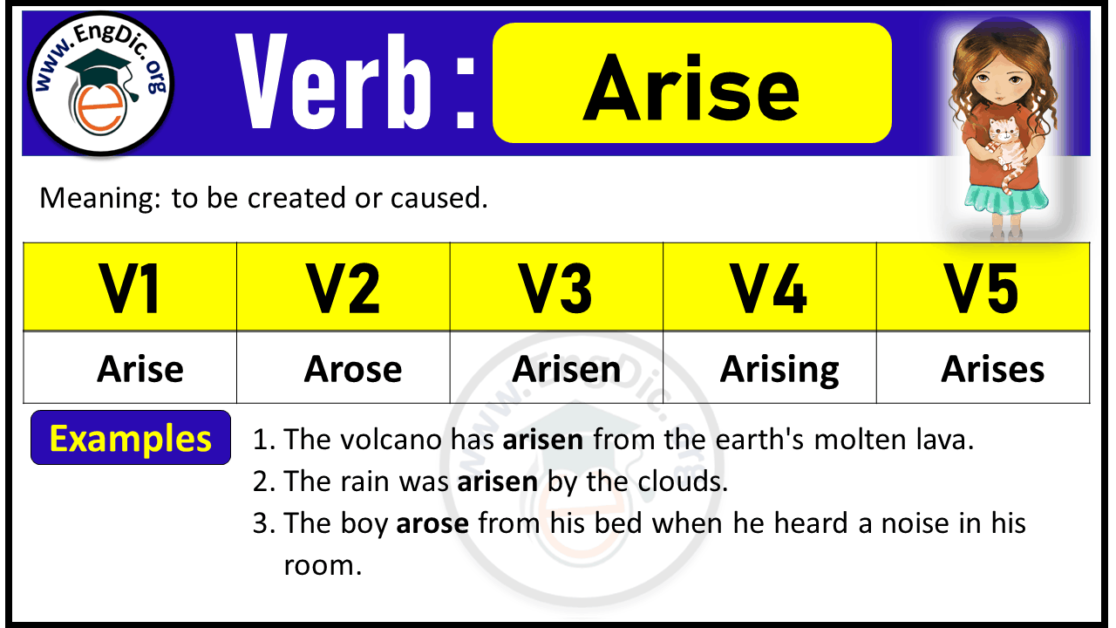
ARISE past participle Archives EngDic
The past tense of the verb "arise" is "arose", and the past participle is "arisen". Verb Tenses Past simple — arise in past simple arose (V2) . Future simple — arise in future simple is arise (will + V1) . Present Perfect — arise in present perfect tense is arisen (have/has + V3) . Past Perfect — arise in past perfect tense is arisen (had + V3) .

Arise A Simple Story Preview Grappling With Your Past
Past Perfect Continuous I had been arising you had been arising he/she/it had been arising we had been arising you had been arising they had been arising. Future I will arise you will arise he/she/it will arise we will arise you will arise they will arise. Future Continuous
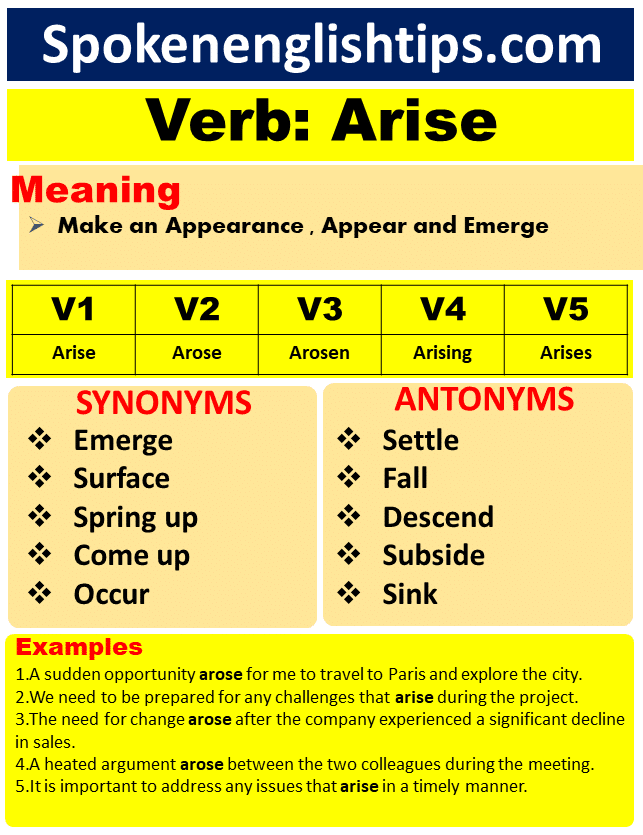
Arise Verb Forms Arise Past Tense, Past Participle & V1 V2 V3 Forms
March 27, 2021 PDF Version arose The past tense of arise is arose Table Of Contents: arose The Forms of Arise Conjugate Arise Arise in Present Simple (Indefinite) Tense Arise in Present Continuous (Progressive) Tense Arise in Present Perfect Tense Arise in Present Perfect Continuous Tense Arise in Past Simple (Indefinite) Tense

Arise Past Tense, Past Participle, Verb Forms V1 V2 V3 V4 V5
Past Continuous Tense He/She/It was arising. I was arising. You/We/They were arising. Past Perfect Tense He/She/It had arisen. I had arisen. You/We/They had arisen. Past Perfect Continuous Tense He/She/It had been arising. I had been arising. You/We/They had been arising. Simple Future Tense He/She/It will/shall arise.
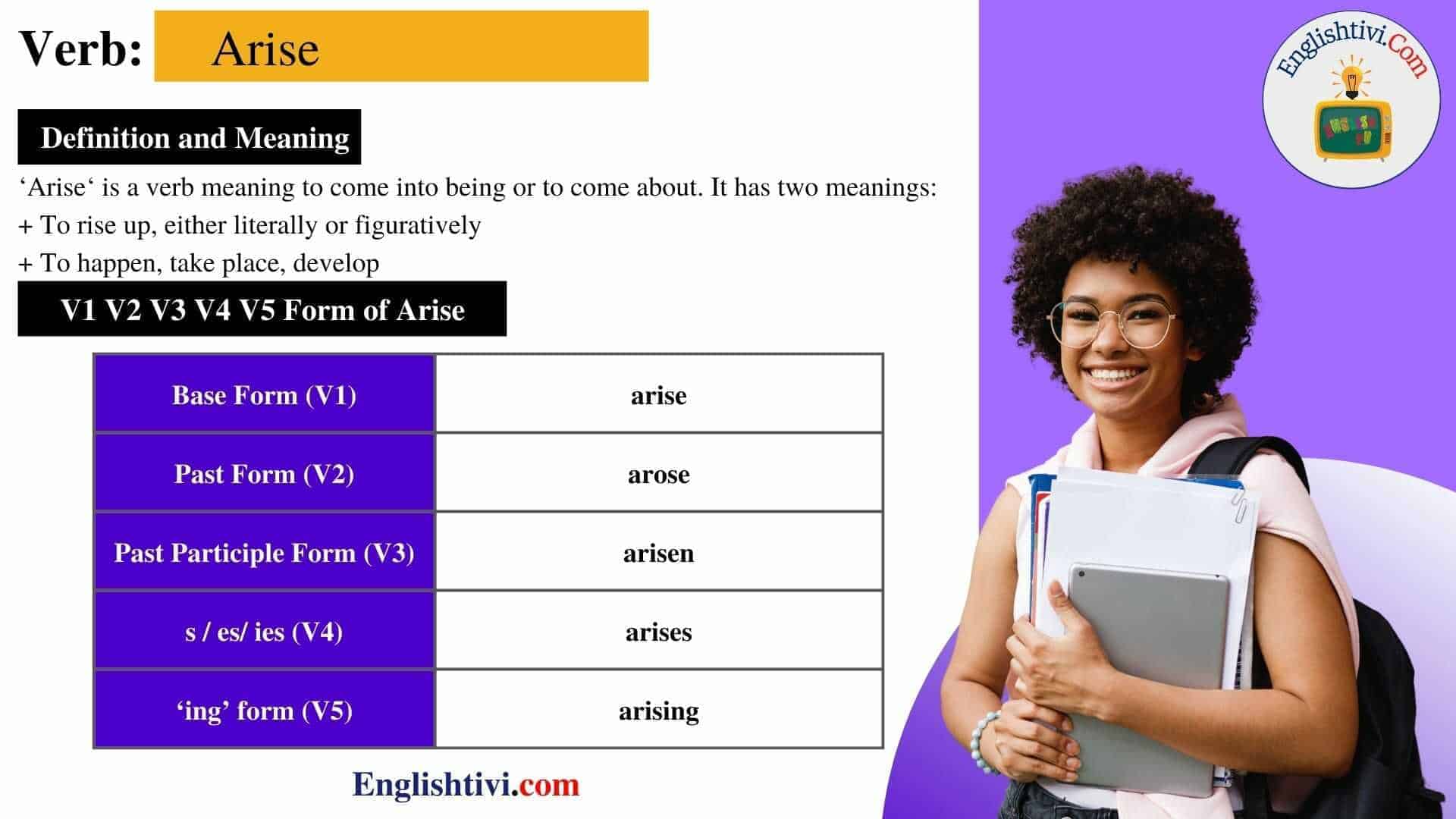
Arise V1 V2 V3 V4 V5 Base Form, Past Simple, Past Participle Form of
past participle: (to) arise arising ari sen definition in Spanish in French in Italian Indicative Perfect tenses Continuous (progressive) and emphatic tenses Compound continuous (progressive) tenses Conditional Imperative Subjunctive *Blue letters in conjugations are irregular forms. ( example)

IRREGULAR VERBS Long list INFINITIVE PAST SIMPLE PAST
Arise Past Simple, Simple Past Tense of Arise Past Participle, V1 V2 V3 Form Of Arise Arise means: emerge, become apparent V1 V2 V3 Form of Arise Synonym Words For ARISE appear begin emerge ensue happen occur emanate stem commence flow follow head originate result rise set in crop up derive issue spring start

Arise A Simple Story Definitive Edition for Nintendo Switch
The imperative mood is a grammatical mood that forms a command or request.. An example of a verb used in the imperative mood is the English phrase "Go." Such imperatives imply a second-person subject (you), but some other languages also have first- and third-person imperatives, with the meaning of "let's (do something)" or "let them (do something)" (the forms may alternatively be called.

Arise V1 V2 V3 V4 V5 , Past Tense, Past Participle Form of Arise
Past simple of arise. You are look at the page for irregular verb arise. Past simple . arose [əˈrəʊz] The past simple tense (sometimes called preterite, simple past or past indefinite) is the basic form of the past tense. This is one of the most common past tenses and can describe a lot of events.

Arise A simple story
Infinitive: to arise Gerund: arising Past participle: arisen Simple past: arose Irregular forms Auxilliary verb Spelling change Use contractions. Positive Negative. Indicative. Positive Negative. Present. I arise I arise: you arise you arise: he/she/it arises he/she/it arises: we arise we arise: they arise they arise:
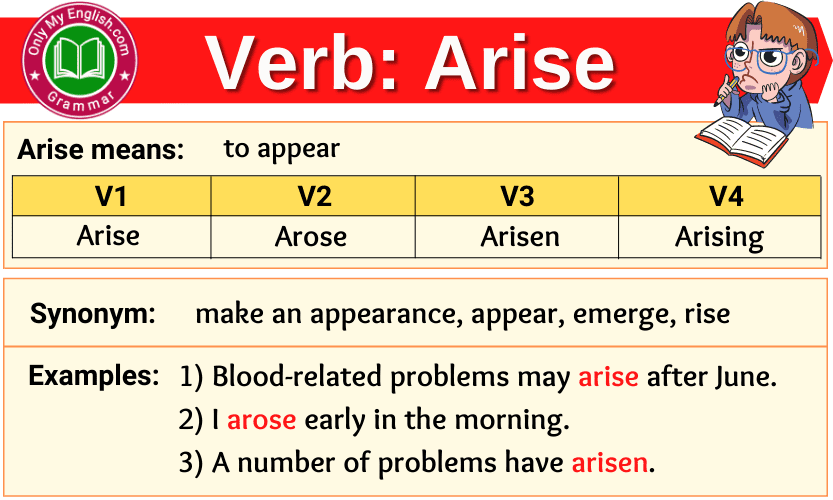
Arise Verb Forms Past Tense, Past Participle & V1V2V3 »
The past participle of "arise" is "arisen." This form is used to create different tenses, such as the present perfect and the past perfect. Here are some examples of "arisen" in a sentence: I have arisen early every day this week. She had arisen from bed when the phone rang. The issue had arisen before, but we were able to resolve it.

Arise A Simple Story Preview Grappling With Your Past
Future Simple. I will arise. you will arise. he, she will arise. we will arise. you will arise. they will arise.

Arise A Simple Story Dev Discuss Epic Games Store Exclusivity
The infinitive of the word form is "arise." The present participle form is "arising." The past tense form is "arose" and past participle form is "arisen." Understanding verb tenses. The general grammar rules that govern past tenses are as follows. The simple past tense form is created by adding a -ed or -d affix to the root word.
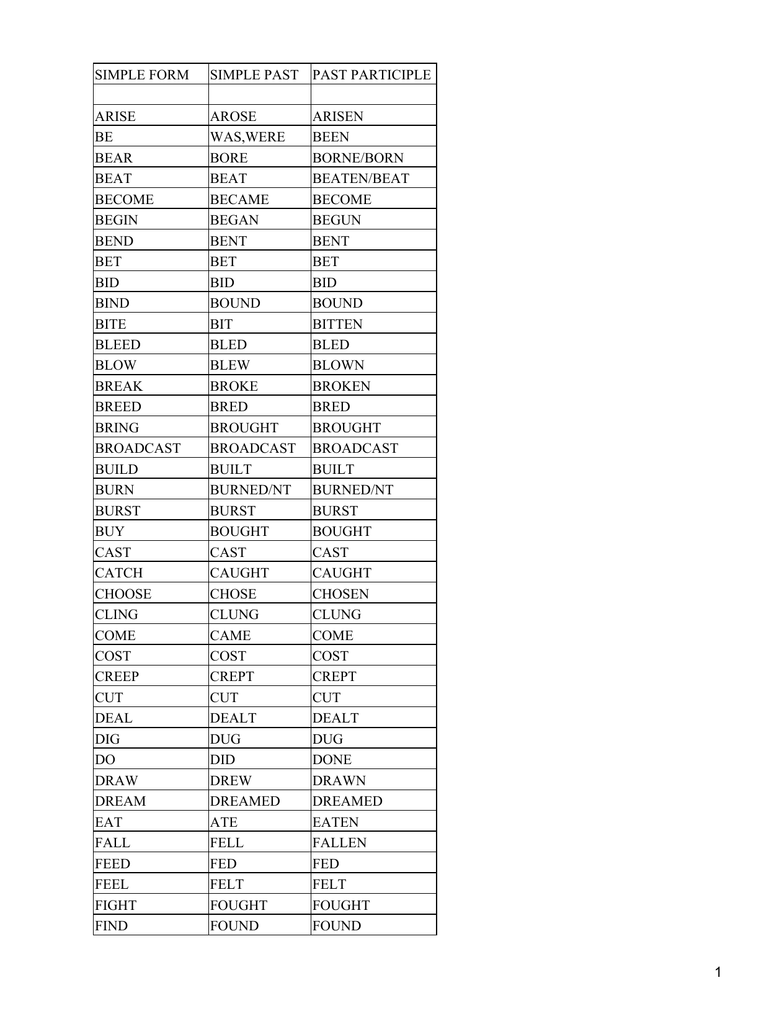
eximir hardware Desviar draw simple past Señuelo acoso soborno
Past Simple: arose Past Partciple: arisen Present Partciple: arising Third Person Singular: arises Definition: 1. To come up from a lower to a higher position. 2. To come up from one's bed or place of repose; to get up. 3. To emerge; become visible. Example (s): 1. She arose from a kneeling posture. 2. He arose early in the morning. 3.
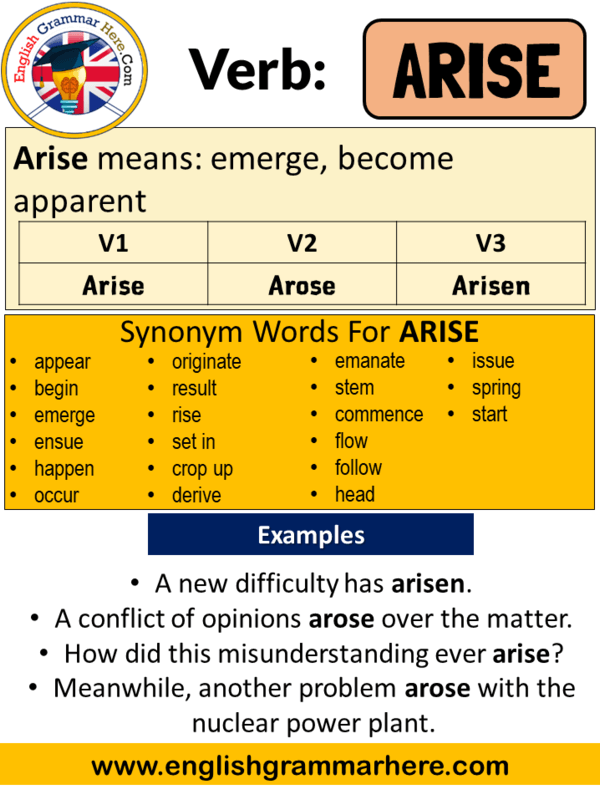
Arise Past Simple, Simple Past Tense of Arise Past Participle, V1 V2 V3
A serious problem can arise if the heart stops pumping effectively. Children should be disciplined when the need arises (= when it is necessary). This issue arose as an unintended consequence of the Act. A new crisis has arisen. We keep them informed of any changes as they arise. A storm arose during the night.